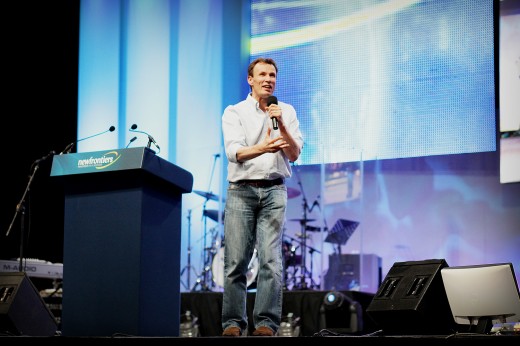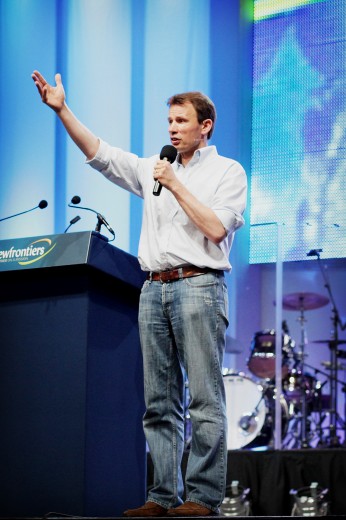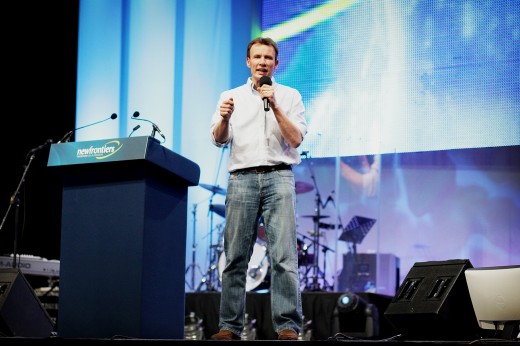 Simon Pettit once preached a movement transforming sermon here at this conference on remembering the poor. Dave asked the question, how have we done since?
Simon Pettit once preached a movement transforming sermon here at this conference on remembering the poor. Dave asked the question, how have we done since?
1 in 4 families struggle go get food on their table in the USA.
In the UK inner cities half of the children live near the poverty line.
Dave took us to Isaiah 58.
What is the broad context?
Everyone was expected to be involved in the care of the needy. There was no welfare state.
We are told to give the poor whatever they need. Deuteronomy 15. Personal and civic life is meant to be marked by generosity. The poor were meant to stop being poor. The freedom from poverty that the year of jubilee represented was not just about a handout. They were given grain and or livestock to help them take responsibility for themselves. Concern in OT is not just individual righteousness but social righteousness. OT asks what has the people as a whole done wrong. Corporate sin is discussed. How have you cared for others?
Broad context is that the poor are cared for. We are meant to be an example of what it would be like if God lived among his people.
What is the immediate context?
They look like they are doing the right things. They pray a lot. Seek God. Long for his presence. Fast a lot. But there is a big problem. They do not care for the poor. We tend to think ministry to the poor is a secondary role to get to when we can. Isaiah puts a much higher priority on it. He says it is an indication of where your hearts are at.
What is our motivation to be for caring for the poor?
A clue is in the term fasting. Our first motivation is worship. When you come to the cross, you understand the heart of the gospel: he who was rich became poor so we who are poor could become rich. When you care for someone who can’t pay you back, it draws you closer to the Father. Giving money causes us to rejoice. Again, it’s because we draw close to God. Prayer, fasting, giving and caring for the unlovely should be characteristics of the people of God.
It enables us to avoid Gods judgment. Paul warns the Corinthians that their lack of care for each other had led to judgment. If we do not care for the needy, and instead horde our blessings, God may lift his hand of blessing. This should therefore be at the heart of our discipleship
How do we go about it?
Isaiah says, v6. Loose chains of Injustice. If anything is stopping people getting clothing shelter and food it should be challenged. Break every yoke.
 If men and women are treated like animals it must be stopped. Where structures or laws are unjust they need to be changed. Good laws and systems foster good behavior and bad laws foster bad behavior. For example the slave trade was legal, so many were involved in it. Only for 100 years have women been allowed to vote in the UK. That previous unjust law brought problems between the sexes.
If men and women are treated like animals it must be stopped. Where structures or laws are unjust they need to be changed. Good laws and systems foster good behavior and bad laws foster bad behavior. For example the slave trade was legal, so many were involved in it. Only for 100 years have women been allowed to vote in the UK. That previous unjust law brought problems between the sexes.
Salt must be as pervasive as sin. Sin get into structures. We must be aware of injustice in our society. Some must learn to bring change.
We get filled with the Spirit so that we can burst out of our churches and into the world.
V7 care for individuals. Share your food with the hungry. Care for your own family first.
1 Tim 5:8. If you don’t care for your family Paul says you have denied the faith.
V10 spend yourself. Personal involvement. What about your street, workplace or school?
God is after your heart primarily.
Ultimate expression of love is the preaching of the gospel. But that is not an excuse for not caring for the poor. Bible assumes we will do both. You can care for the poor without putting at risk everything else you are doing. Sometimes it’s fear that holds us back.
We extend mercy but demand responsibility. Don’t just continue to bail people out. Rather help someone take responsibility for their own life.
If we would do what the prophet asks what might happen?
- God promises to work in you. V8 healing appears quickly. Our needs will be satisfied in a desert v11. Even when it’s difficult God can help us be like an oasis
- God promises to work though you. Light will shine to the Gentiles. People will be drawn to us. As we care for the poor authorities ask what are you doing. Nobody else expects transformed lives. If you want to build relationships with your local authorities then care for the poor. More influence and evangelistic strength results.
- God promises to go with you: like a reputation going before us.
- God promises to create something together with us. Corporate blessing. Rebuilding the ruins. That God would dwell with men. Communities that are known for their love for the poor. Not just mercy but transformed lives. Expressing love. Showing the heart of the gospel.
















